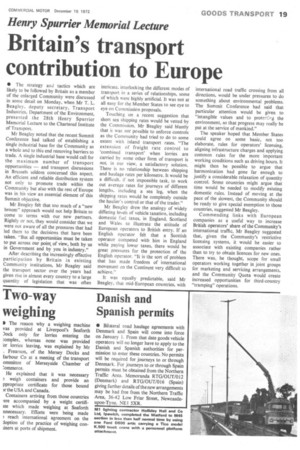Henry Spurner Memorial Lecture
Page 21

If you've noticed an error in this article please click here to report it so we can fix it.
Britain's transport contribution to Europe
• The strategy an„.1 tactics which are likely to be followed by Britain as a member of the enlarged Community were discussed in some detail on Monday, when Mr T. L. Beagley, deputy secretary, Transport Industries. Department of the Environment, presented the 28th Henry Spurrier Memorial Lecture to the Chartered Institute of Transport.
Mr Beagley noted that the recent Summit Conference had talked of establishing a single industrial base for the Community as a whole and to this end removing barriers to trade. A single industrial base would call for the maximum number of transport opportunities — and transport discussions in Brussels seldom concerned this aspect. An efficient and reliable distribution system not only to promote trade within the Community but also with the rest of Europe was in his view an essential element of this Summit objective.
Mr Beagley felt that too much of a "new broomapproach would not help Britain to come to terms with our new partners. Rightly or not, they would consider that we were not aware of all the pressures that had led them to the decisions that have been taken. But all opportunities must be taken to put across our point of view, both by us in Government and by you in industry."
After describing the increasingly effective participation by Britain in existing Community institutions, Mr Beagley said the transport sector over the years had given rise in almost every country to a large quantity of legislation that was often intricate, interlocking the different modes of transport in a series of relationships, some of which were highly artificial. It was not at all easy for the Member States to see eye to eye on Commission proposals.
Touching on a recent suggestion that short sea shipping rates would be vetted by the Commission, Mr Beagley said bluntly that it was not possible to enforce controls as the Community had tried to do to some extent with inland transport rates. "The extension of freight rate control to 'combined transport' when lorries are carried by some other form of transport is not, in our view, a satisfactory solution. There is no relationship between shipping and haulage rates per kilometre. It would be a difficult. if not impossible task, to work out average rates for journeys of different lengths, including a sea leg, when the shipping rates would be completely outside the haulier's control or that of the trader."
Mr Beagley drew the analogy of widely differing levels of vehicle taxation, including domestic fuel taxes, in England, Scotland and Wales to illustrate the attitude of European operators to British entry. If an English operator felt that a Scottish operator competed with him in England while paying lower taxes, there would be great pressures for the protection of the English operator. "It is the sort of problem that has made freedom of international movement on the Continent very difficult to achieve."
It was equally predictable, said Mr Beagley. that mid-European countries, with international road traffic crossing from all directions, would be under pressures to do something about environmental problems. The Summit Conference had said that particular attention would be given to "intangible values and to prote:7'.:og the environment, so that progress may really be put at the service of mankind."
The speaker hoped that Member States could agree on some basic, not too elaborate, rules for operators' licensing, aligning infrastructure charges and applying common rules for the more important working conditions such as driving hours. It might then be possible to argue that harmonization had gone far enough to justify a considerable relaxation of quantity control. Some countries might argue that time would be needed to modify existing domestic rules. Instead of moving at the pace of the slowest, the Community should be ready to give special exemption to those countries, suggested Mr Beagley.
Commending links with European companies as a useful way to increase British operators' share of the Community's international traffic, Mr Beagley suggested that, given the Community's restrictive licensing systems, it would be easier to associate with existing companies rather than to try to obtain licences for new ones. There was, he thought, scope for small operators working together in joint groups for marketing and servicing arrangements, and the Community Quota would create increased opportunities for third-country "tramping" operations.




































































































